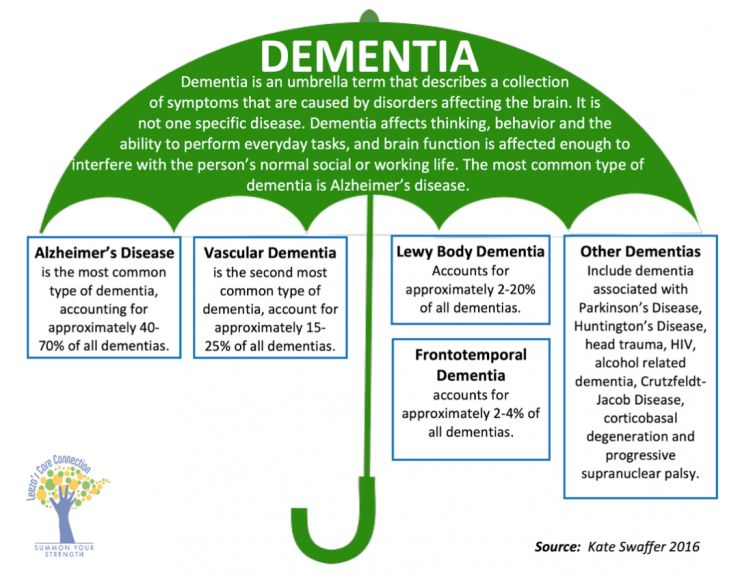What Is Dementia?
WHAT IS DEMENTIA?
Dementia is a general term and describes a group of symptoms associated with a decline in memory, reasoning or other thinking skills and is severe enough to interfere with daily life. It is caused by physical changes in the brain and may lead to other diseases, like Alzheimer’s disease. Some types of dementia are reversible, whereas others are not.

ALZHEIMER'S DISEASE
Alzheimer’s is the most common type of dementia. It’s a slowly progressive brain disease that begins well before symptoms emerge. There is currently no cure clinically proven treatment for Alzheimer’s disease.
Symptoms of Alzheimer’s may include:
- Difficulty remembering recent conversations, names or events is often an early clinical symptom
- Apathy and depression are also often early symptoms
- Later symptoms include impaired communication, poor judgment, disorientation, confusion, behavior changes and difficulty speaking, swallowing and walking.

10 Dementia Warning Signs & Symptoms
- Memory loss: Forgetting recently learned information is one of the most common early signs of dementia. A person begins to forget more often and is unable to recall the information later.
- Difficulty performing familiar tasks: People with dementia often find it hard to complete everyday tasks that were once so familiar, that were nearly automatic. Individuals may forget the steps to prepare a meal, use a household appliance or participate in a lifelong hobby.
- Problems with language: People with Dementia related diseases like Alzheimer’s often forget simple words or substitute unusual words, making their speech or writing hard to understand. They may be unable to find the toothbrush, for example, and instead ask for “that thing for my mouth.''
- Disorientation to time and place. People can become lost in their own neighborhoods, forget where they are or how they got there and not know how to get back home.
- Poor or decreased judgement. Those with dementia or cognitive decline may dress inappropriately, wearing several layers on a warm day or little clothing in the cold. They may show poor judgement about money, like giving away large sums to telemarketers.
- Problems with abstract thinking. Balancing a checkbook is a task that can be challenging for some. But a person with Alzheimer’s may forget what numbers are and how they should be used.
- Misplacing things. Anyone can temporarily misplace a wallet or key. A person with Dementia however may put things in unusual places: an iron in the freezer or a wristwatch in the sugar bowl.
- Changes in mood or behavior: Someone with a type of dementia can show rapid mood swings-from calm tears to anger-for no apparent reason.
- Changes in personality. The personalities of people with dementia can change dramatically. They may become extremely confused, suspicious, fearful or dependent on a family member.
- Loss of initiative. A person with a type of dementia may become very passive, sitting in front of the TV for hours, sleeping more than usual or not wanting to do usual activities.
Diagnosing Alzheimer’s
Alzheimer’s is diagnosed through a complete medical assessment. Doctors conduct tests to assess memory impairment and other thinking skills, judge functional abilities, and identify behavior changes. They also perform a series of tests to rule out other possible causes of impairment. If you or a loved one have concerns about memory loss or other symptoms of Alzheimer’s or dementia, it is important to be evaluated by a physician.
There is no single test that can show whether a person has Alzheimer’s. While physicians can almost always determine if a person has dementia, it may be difficult to determine the exact cause.
Diagnosing Alzheimer’s requires careful medical evaluation, including:
- A thorough medical history
- Mental status testing
- A physical and neurological exam
- Tests (such as blood tests and brain imaging) to rule out other causes of dementia-like symptoms
Having trouble with memory does not mean you have Alzheimer’s. Many health issues can cause problems with memory and thinking. Your doctor may order other tests to rule out diseases that may be causing your symptoms. Generally speaking, doctors will perform a physical evaluation and check that you don’t have other health conditions that could be causing or contributing to your symptoms, such as signs of past strokes, Parkinson’s disease or other medical conditions. When dementia-like symptoms are caused by treatable conditions — such as depression, drug interactions, thyroid problems, excess use of alcohol or certain vitamin deficiencies — they may be reversed.
Benefits of Early Diagnosis
While it’s true that if you have Alzheimer’s or a related disease, doctors can’t offer a cure. But getting an early diagnosis can be beneficial. Knowing what you can do is just as important as knowing what you can’t do. If a person has another treatable condition that’s causing the cognitive impairment or somehow complicating the impairment, then doctors can start treatments.
Although the onset of Alzheimer’s disease cannot yet be stopped or reversed, an early diagnosis allows people with dementia and their families:
- Appropriate community services and resources
- Options for residential and at-home care
- Plans for handling financial issues
- Expectations for future care and medical decisions
When a doctor tells you and your family members about an Alzheimer’s diagnosis, he or she should help you understand Alzheimer’s, answer questions and explain what to expect with Alzheimer’s.